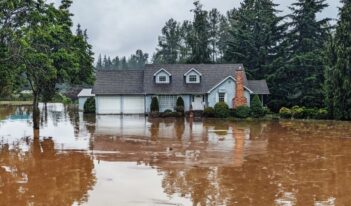
In this Saturday Seminar, we collect scholarship on using space technology governance to fight climate change.
The United Nations Intergovernmental Panel on Climate Change issued an urgent warning about climate change, stating that it is “now or never” to halve global greenhouse gas emissions by 2030. This warning drew from extensive technical studies of projected global temperature rise, emissions tracking, land cover, and more.
But where do these observations come from? Space technologies provide much of the data that scientists rely on to make critical climate change observations.
Space missions that contribute to climate change research involve satellites that observe environmental phenomena such as weather, atmospheric conditions, and oceanic and sea ice conditions. From the vantage point of a satellite, data collection becomes feasible at a large scale. For example, satellites can identify methane leaks with an accuracy that is impossible on the ground.
The global nature of space-faring activities necessitates regulation on the international level. The Outer Space Treaty governs international space exploration. The United Nations Office for Outer Space Affairs (UNOOSA) promotes the use of “space science and technology for sustainable economic and social development.” Incorporating climate change into one of its sustainability development goals, UNOOSA urges partners to combat climate change and its impacts.
Some astronomers, however, point out that their own scientific practices also contribute to climate change. Running supercomputers and flying between meetings and observatories are carbon-intensive activities. In response, some astronomers have moved to using more efficient coding languages and encouraged virtual observatory opportunities and meetings.
In this week’s Saturday Seminar, we collect scholarship by experts who discuss ways that outer space governance can contribute to climate change solutions.
- In an article for William & Mary Environmental Law and Policy Review, Paul B. Larsen discusses the treaties that govern space technologies that contribute to climate sensing, measuring, and monitoring. Larsen explains that the Paris Agreement applies to space technology such as the Article 10 technology transfer mandate encapsulating satellite remote sensing, weather, and other types of outer space tech that could be used to fight climate change. Larsen argues that, in order for space technology to assist the goals of the Paris Agreement, space-faring countries should make climate change information freely available and assist in building space-faring capacity for other countries.
- In the book Manual of Digital Earth, Huadong Guo of the Chinese Academy of Sciences, Michael F. Goodchild of the University of California, Santa Barbara, and Alessandro Annoni of the European Commission Joint Research Centre discuss the possibility of using digital earth data—data obtained through multiple satellites and powerful analytical tools—to promote the United Nations’ Sustainable Development Goals (SDGs). The authors argue that access to digital earth data could improve the implementation of the SDGs by providing relevant and timely data on earth systems by use of satellites. But they caution that governance questions about what kind of data uses are ethical and legal remain. They also recommend that companies implement standards for storing and accessing metadata to ensure the quality of the data.
- Countries should explore the connections between space exploration and precautions to safeguard against climate change, Thabo Magubane argues in a recent article. Magubane recommends that countries adopt treaties to regulate space activity and hold one another accountable by invoking liability against nations that “recklessly use the outer space in a manner that is environmentally unfriendly.” Magubane also advocates integrating “space lawyers”—which include lawyers involved with International Courts and International Tribunals—into existing measures taken to mitigate climate change.
- In an article in Space Legal Issues, Jonathan Lim contends that the use of space technologies and space law can provide a “compelling blueprint” for tackling climate change and human rights principles such as the right to a healthy environment. According to Lim, intergovernmental organizations should begin exploring the connections between outer space and the environment by amending the Outer Space Treaty to apply existing environmental protection principles to the outer space context. Lim also recommends forming a treaty-based body to examine the connections between human rights and outer space and supporting local efforts to inform communities of the utility of space law for addressing climate change.
- The report on space traffic management by the National Academy of Public Administration (NAPA) gives inadequate attention to the threat of climate change, argues Paul B. Larsen in an article published in the Journal of Air Law and Commerce. The Trump Administration contracted with NAPA in 2020 to evaluate the feasibility of private regulation of space traffic. According to Larsen, the NAPA report mistakenly assumes that commercial promotion is the government’s primary objective in space policy. Moreover, the report discounts the interests of scientists, who use outer space technologies to measure climate conditions.
- The United Nations General Assembly recently adopted the “Space2030” Agenda, which aims to strengthen the use of space activities to address sustainable development concerns. The member nations hope to advance the use of space technologies to observe and analyze climate change, as well as promote international collaboration in climate change prevention. In the report, the United Nations also foresees a role for space technologies in sustainable fisheries management, agriculture, and food safety. By implementing the Space2030 Agenda, the member nations seek to ensure the long-term sustainability of outer space activities.
The Saturday Seminar is a weekly feature that aims to put into written form the kind of content that would be conveyed in a live seminar involving regulatory experts. Each week, The Regulatory Review publishes a brief overview of a selected regulatory topic and then distills recent research and scholarly writing on that topic.



